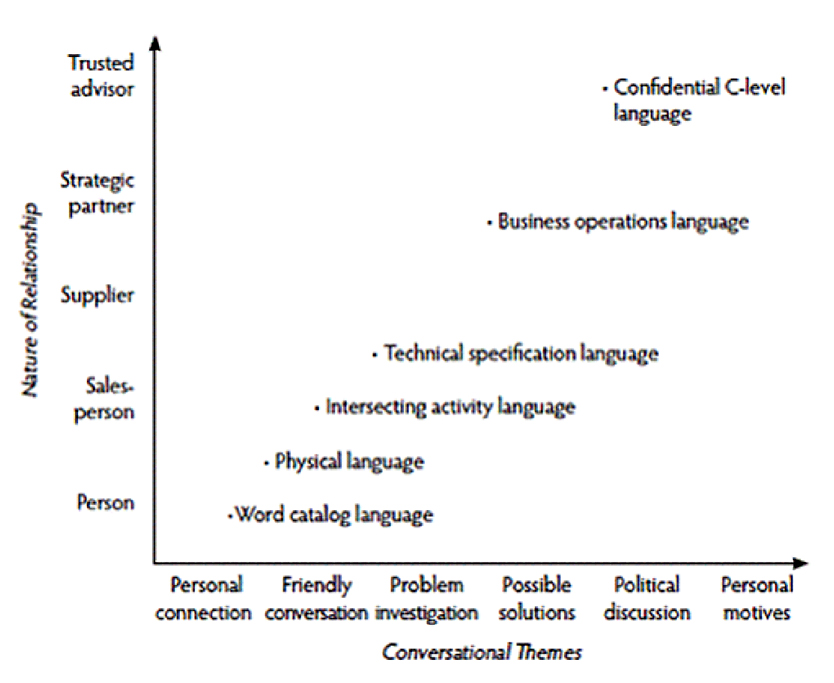Traditional sales psychology based upon the assessment of the customer’s personality traits is obsolete. The typical descriptions of personality types have little relevance to C-level sales calls and presentations. In reality, the most important psychological factor is the language that the prospective customer uses. Sales Linguistics --the study of how the customer’s mind creates and interprets language during the decision-making process-- is the new sales psychology!
In my new book Heavy Hitter Sales Psychology: How to Penetrate the C-Level Executive Suite and Convince C-Level Executives to Buy, I teach salespeople how to winover senior executives using Sales Linguistics. But what exactly is Sales Linguistics?
Every day, you speak and listen to thousands of words. Through the words you speak, you are able to explain your ideas, recount your past experiences, and share your personality with others. Since the communication process comes so naturally, you assume you are understood. However, the most important words you speak during the entire year are those you say to C-level executives during the make-or-break meetings that determine if you will win a deal.
Most of the time, you probably don’t think about the specific meaning of the words you are using. Since the words are so integrated with your being, they just seem to happen. However, your words represent your attitude, outlook, and perspective about life. But language doesn’t consist solely of spoken words, it has an entirely nonverbal dimension as well. You actually use a series of different languages to communicate to the others and to understand what they are saying to you. The seven languages that are at the foundation of Sales Linguistics are:
- Word catalog language. The mind’s method for receiving and interpreting information based upon the three sensory channels—visual, auditory, and kinesthetic (feelings and a sense of the body).
- Internal dialogue language. The never-ending stream of communication inside the mind that represents honest, unedited, and deep feelings.
- Physical language. Also known as body language, the nonverbal communication that is constantly being emitted by the executive’s body posture.
- Intersecting activity language. Interests, hobbies, and personal pursuits by which the executive displays his personality, beliefs, and values.
- Technical specification language. The androgynous, nonpersonal, and technical communication that is based upon the nomenclature and technical terms of the executive’s industry. For example, the computer industry terms RAM, CPU an megabyte.
- Business operations language. The language that is specific to the daily running of the executive’s business and his role in the organization.
- C-level language. The most powerful trust-based language by which the executive explains his personal needs, desires, and plans along with the strategy by which he hopes to fulfill them.
The ultimate goal for the C-level meeting is simple: you want the executive to expose his internal dialogue to you. You want him to honestly explain what he is trying to accomplish and why he is doing it from a business and, more importantly, personal standpoint. You want him to tell you about his personal naeeds and career desires along with how he plans to fulfill them. You want him to speak the confidential C-level language with you. In order to do so, you must progress through the various languages represented by the figure below.

Unfortunately, the majority of executive conversations never reach the confidential C-level language. The discussion gets stuck at the technical specification language or the business operations language.
Remember, your most important competitive weapon is your mouth and the words you speak. While you will frequently meet with lower-level and midlevel employees at companies whose business you’re trying to secure, the rare conversations you have with C-level decision makers will directly determine whether you win or lose the deal. Therefore, it is critical that you understand how C-level executives think and how they communicate and that you are able to adapt your use of language to match C-level decision makers’. Now more than ever, you need to understand and master Sales Linguistics.
Steve W. Martin is author of Heavy Hitter Sales Psychology: How to Penetrate the C-Level Executive Suite and Convince Company Leaders to Buy. The heavy hitter sales philosophy has helped more than fifty-thousand salespeople become top revenue producers at leading technology companies including IBM, Akamai, and McAfee Software. For article feedback, contact Steve at
stevemartin@heavyhitterwisdom.com

